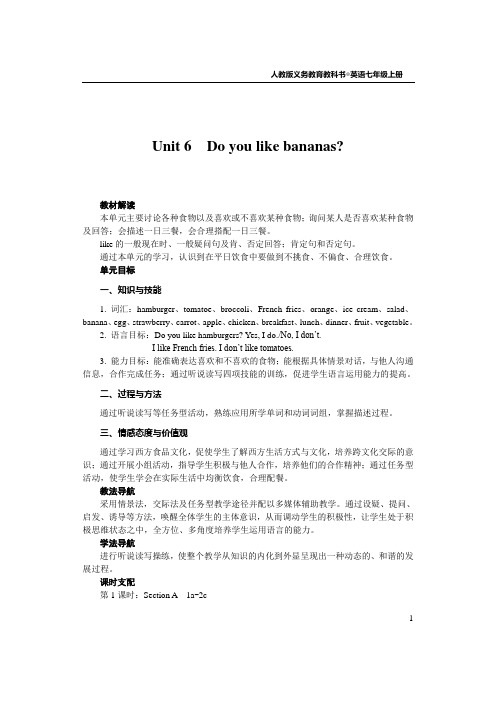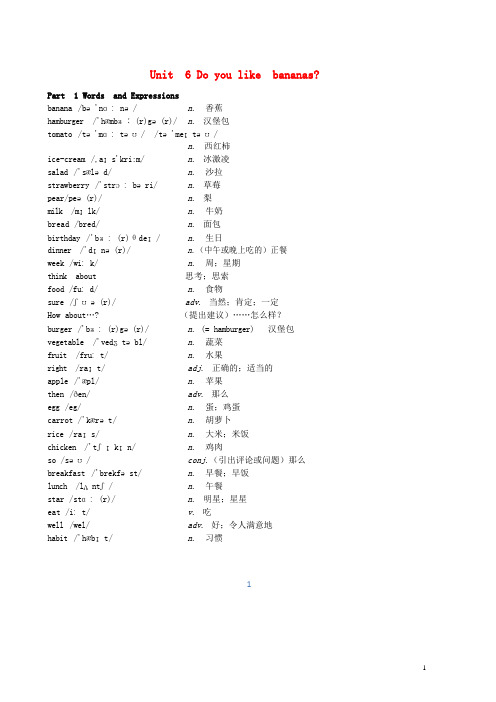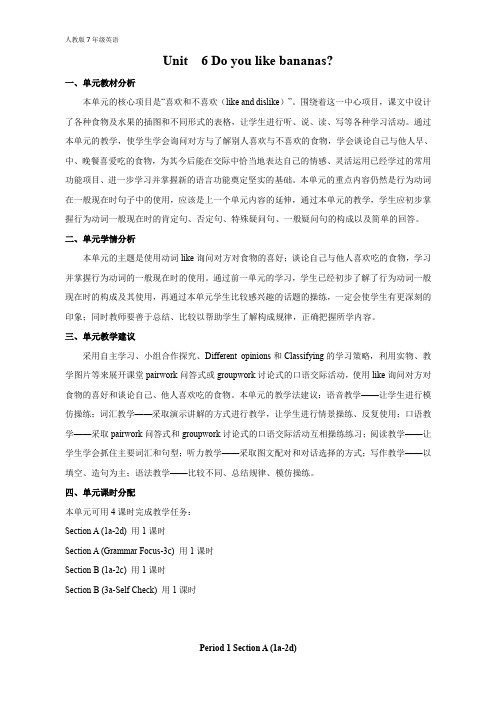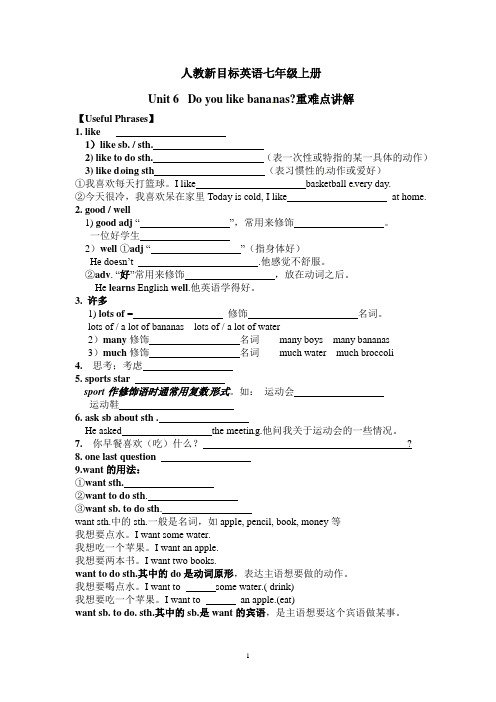新目标人教版七年级英语上册unit6课件
新目标英语七年级上册Unit6_Do_you_like_bananas课标解析

新目标英语七年级上册Unit6 Do you like bananas?课标解析
许晏菱初2014级
教材分析
本单元的主题是教会学生在日常生活中养成健康饮食的习惯。
整个单元以食物名词为主题,以一般现在时的like进行对话为途径,从听说读写等方面开展学习任务。
语法的重点是行为动词的一般现在时。
由于课文以对话展现,学生很容易地把生活中的情景和书上的对话以及文段比较自然地联合起来。
本单元的中心话题是Food,主要语言功能项目是Talk about likes and dislikes.当主语是第三人称单数时句型的变化以及回答是本单元的语法重点。
在第五单元学生已经对do and does 有了一定的认识。
本单元主要句型:Do you like…? 及其回答Yes, I do. / No, I don’t.学生就容易理解。
综上所述,本单元以食物为主线,围绕着谈论喜欢与不喜欢以及一日三餐等语言功能项目展开了一系列任务活动。
要求学生能够用英语写一篇介绍自己家人喜欢和不喜欢的食物,养成健康饮食的习惯。
单元教学安排
本单元分为5个课时,分别是sectionA两课时,sectionB两课时,一课时阅读课。
单元目标
课时目标
思想情感目标:
1)通过学习文章,学会养成健康饮食的习惯。
2)学习养成节约粮食,爱惜食物的品质。
能力发展目标:
1)能掌握书面表达的基本写法。
2)能正确使用可数名词和不可数名词。
3)能掌握一般现在时的结构、意义和用法。
人教版新目标 七年级英语初一上册Unit6单元教案设计含教学反思

人教版义务教育教科书◎英语七年级上册Unit 6 Do you like bananas?教材解读本单元主要讨论各种食物以及喜欢或不喜欢某种食物;询问某人是否喜欢某种食物及回答;会描述一日三餐,会合理搭配一日三餐。
like的一般现在时、一般疑问句及肯、否定回答;肯定句和否定句。
通过本单元的学习,认识到在平日饮食中要做到不挑食、不偏食、合理饮食。
单元目标一、知识与技能1. 词汇:hamburger、tomatoe、broccoli、French fries、orange、ice cream、salad、banana、egg、strawberry、carrot、apple、chicken、breakfast、lunch、dinner、fruit、vegetable。
2.语言目标:Do you like hamburgers? Yes, I do./No, I don’t.I like French fries. I don’t like tomatoes.3. 能力目标:能准确表达喜欢和不喜欢的食物;能根据具体情景对话,与他人沟通信息,合作完成任务;通过听说读写四项技能的训练,促进学生语言运用能力的提高。
二、过程与方法通过听说读写等任务型活动,熟练应用所学单词和动词词组,掌握描述过程。
三、情感态度与价值观通过学习西方食品文化,促使学生了解西方生活方式与文化,培养跨文化交际的意识;通过开展小组活动,指导学生积极与他人合作,培养他们的合作精神;通过任务型活动,使学生学会在实际生活中均衡饮食,合理配餐。
教法导航采用情景法,交际法及任务型教学途径并配以多媒体辅助教学。
通过设疑、提问、启发、诱导等方法,唤醒全体学生的主体意识,从而调动学生的积极性,让学生处于积极思维状态之中,全方位、多角度培养学生运用语言的能力。
学法导航进行听说读写操练,使整个教学从知识的内化到外显呈现出一种动态的、和谐的发展过程。
课时支配第1课时:Section A 1a-2c1第2课时:Section A 3a-3c第3课时:Section B 1a-2c第4课时:Section B 3a-Self Check课时教案第1课时Section A1a-2c教学目标一、知识与技能1. 掌握基本词汇:food、banana、hamburger、tomato、broccoli、French fries、strawberry、orange、ice cream、salad。
七年级英语上册 Unit6 Do you like bananas Section A 2课件 人教新目标版

3. I like bananas. 我喜欢香蕉。 (1) like表示“喜欢”, 是动词。如果主语 是 第三人称单数, 后要加“s”。例如: He likes apples. 他喜欢苹果。 (2) 否定形式要在like前加don’t或在likes 前加doesn’t, 同时把likes改为like。 I don’t like bananas. 我不喜欢香蕉。 He doesn’t like apples. 他不喜欢苹果。
IV. Exercise
一. 按要求写出下列单词 1. watch(复数)________ watches 2. carrot(复数)________ carrots 3. sound(第三人称单数)_______ sounds 4. tomato(复数)________ tomatoes 5. I(宾格)____ me 6. it is(缩写)_____ it's
2. Do you like oranges? orange n. 既可以是可数名词, 也可以 做不可数名词。当可数名词时, 意思是 “橘子”;当不可数名词时,意思是橘汁。 如:Can I have an orange juice, please? 我可以要一杯橘汁吗? I like oranges better than tomatoes. 与西红柿比,我比较喜欢橘子。
二.词汇 1. We have __________ (蔬菜)for dinner vegetables every day. 2. We have _____ (许多)clubs. Join us soon. many 3. Edle doesn't like ________ (西红杮). tomatoes 4. —Let's eat ice cream. —That sounds (听起来)good. ______ 5. I like ____________(草莓)very much. strawberries
七年级英语上册 Unit 6 Do you like bananas(第5课时)Section B(2a-3b)课件 (新版)人教新目标版

二、根据句意及汉语提示写单词。
6.Dale's brother _w_a_n__ts_(想要) an apple. 7.My son has good eating _h_a_b_i_t_s (习惯). 8.Fruit and vegetables are __h_e_a_lt_h_y_(健康的) food. 9.You can ask me some __q_u_e_s_ti_o_n_s_(问题). 10.The picture is __r_e_a_ll_y__(真正地) nice.
Unit 6 Do you like bananas?
第五课时 Section B(2a~3b)
1.Sports star eats well.体育明星吃得好。 (1)sports star体育明星。 (2)eats是eat的第三人称单数形式。在一般现在时中,当主语是 第三人称单数,就用动词的第三人称单数形式。 (3)well adv.好,主要用于修饰动词。 2.ask sb. about sth.向某人询问某事 3.her eating habits她的饮食习惯 此处eating作定语。eg: I have good eating habits.我有好的饮食习惯。
4.healthy 形容词,意为“健康的”,其名词形式为health,其反义词为 unhealthy。 5.I don't want to be fat.我不想长胖。 want“要,想要”,常用结构有:want sth.“想要某物”;want to do sth.“想做某事”,want sb. to do sth.“想要某人做某事”。 6.What do you like for breakfast?你早餐喜欢什么? (1)for 介词,意为“为了,给”,在句型“have…for breakfast/lunch/dinner”中表示“某人吃什么。” (2)breakfast前面不能用冠词,一日三餐前一般不加冠词。
人教版2020年七年级英语上册Unit6Doyoulikebananas讲义(新版)人教新目标版

Unit 6 Do you like bananas?Part 1 Words and Expressionsbanana /bə'nɑːnə/ n. 香蕉hamburger /'hæmbɜː(r)gə(r)/ n. 汉堡包tomato /tə'mɑːtəʊ/ /tə'meɪtəʊ/n. 西红柿ice-cream /,aɪs'kri:m/ n. 冰激凌salad /'sæləd/ n. 沙拉strawberry /'strɔːbəri/ n. 草莓pear/peə(r)/ n. 梨milk /mɪlk/ n. 牛奶bread /bred/ n. 面包birthday /'bɜː(r)θdeɪ/ n. 生日dinner /'dɪnə(r)/ n.(中午或晚上吃的)正餐week /wiːk/ n. 周;星期think about 思考;思索food /fuːd/ n. 食物sure /ʃʊə(r)/ adv. 当然;肯定;一定How about…?(提出建议)……怎么样?burger /'bɜː(r)gə(r)/ n. (= hamburger) 汉堡包vegetable /'vedʒtəbl/ n. 蔬菜fruit /fruːt/ n. 水果right /raɪt/ adj. 正确的;适当的apple /'æpl/n. 苹果then /ðen/adv. 那么egg /eg/ n. 蛋;鸡蛋carrot /'kærət/ n. 胡萝卜rice /raɪs/ n. 大米;米饭chicken /'tʃɪkɪn/ n. 鸡肉so /səʊ/ conj.(引出评论或问题)那么breakfast /'brekfəst/ n. 早餐;早饭lunch /lʌntʃ/ n. 午餐star /stɑː(r)/ n. 明星;星星eat /iːt/ v. 吃well /wel/ adv. 好;令人满意地habit /'hæbɪt/ n. 习惯1healthy /'helθi/adj. 健康的really /'riːəli/ adv. 真正地question /'kwestʃən/ n. 问题want /wɒnt/ v. 需要;想要be /biː/ v. 变成fat /fæt/adj. 肥的;肥胖的Part 2:Texts课文(一)Jack: Hey, John’s birthday dinner is next week. Let’s think about the food.Tom: Sure. How about burgers, vegetable salad, and some fruit? Bill: Sounds good. John likes hamburgers.Jack: Oh, I don’t like salad.Bill: But John likes salad, and it’s his birthday.Jack: Yes, you’re right. What about the fruit?Tom: I think John likes strawberries and apples.Jack: OK. Let’s have strawberries and applesthen.Structure——谈论好恶1.Do you like salad? Yes, I do./No, I don’t.2.Do they like pears? Yes, they do./ No, they don’t.3.Does she like tomatoes? Yes, she does./ No, she doesn’t.4.I like oranges. I don’t like bananas.5.We like rice. We don’t like hamburgers.6.He likes ice-cream. He doesn’t like vegetables.重点句型:—Do / Does sb. like…?—Yes, sb. do / does.—No, sb. don’t / doesn’t.sb. like/likes ….sb. don’t/doesn’t like ….Underline the correct words in the brackets.在括号内正确的单词下画线。
七年级英语上册-Unit6-Do-you-like-bananas课件-人教新目标版

a banana s
a hamburger s
a tomatoes
broccoli
French fries
an orange s
ice cream
a strawberry ies
a pears
salad
Let’s have a big meal.(让我们大吃一顿.)
Explanation
1. Running star Sandra Clark eats lots of healthy food. some , many , lots of , a lot of 的区别 (1) some 意思是 “一些”, 可以修饰 可 数名词,也可以修饰不可数名词。 如:some friends 一些朋友 some water 一些水
Sandra: No, I don’t like vegetables.
Well, only salad. I like
salad. But I like fruit. I like
bananas, oranges…
Tom: How about apples? I don’t like apples!
hamburgers
French fries
ice cream
tomatoes
broccoli
strawberry strawberries salad
/e/ e
pears
bananas
oranges
/ e/
1a Match the words
1. hamburgers 2. tomatoes 3. broccoli 4. French fries 5. orange 6. ice cream 7. salad 8. bananas 9. strawberries 10.pears d g a h e f c b i j
七年级英语Unit 6 It’s raining! 人教版(新目标)知识精讲

英语Unit 6 It’s raining! 人教版(新目标)【本讲教育信息】一. 教学内容:Unit 6 It’s raining!二. 语言功能:Describe the weather; Describe what you are doing描述天气;描述你在干什么三. 目标语言:1. How is the weather? It’s raining/windy/cloudy/sunny/snowing.2. What are you doing? I’m watching TV.3. What are they doing? They are studying.4. What is she/he doing? She/He is playing basketball.5. How’s it going? Great./ Not bad./Terrible./ Pretty good.四. 重点单词和词组:1. weather 天气不可数名词可用形容词bad, fine来修饰The weather is good(fine)today.练一练_______ good weather today!A. What aB. WhatC. How aD. How2. 表示天气的词rain-rainy多雨的wind-windy 有风的cloud-cloudy 多云的snow-snowy 有雪的sun-sunny 晴朗的fog-foggy 有雾的hot 热的cold 寒冷的cool 凉爽的warm 温暖的humid 潮湿的dry 干燥的练一练(1)The _____ is blowing. It’s _____.A. wind, windB. wind, windyC. windy, windyD. windy, wind(2)There _____ snow in Canada every year.A. has manyB. has muchC. are manyD. is much(3)What do you do when it________?A. rainingB. rainC. is rainyD. is rain(4)There are lots of ______(cloudy)in the sky today.The weather is _______(sun)and humid.It’s _________(rain)outside. Take the umbrella with you.3. surprised 感到惊讶的surprise 惊奇惊讶surprising令人惊讶的be surprised 感到惊讶be surprised at…对……感到惊讶He is surprised thatI can speak English. 他很惊讶我会讲英语I am much surprised at the news. 听到这消息我感到非常吃惊。
Unit 6 (单元复习课件)-七年级英语上册(人教新目标Go for it!)

➢ 三单:Does+主语+like+宾语? Yes,主语代词 does./No,主语代词
doesn’t. John喜欢他们吗?不,他不喜欢。 _D_o_es_ _J_o_h_n_li_k_e_t_h_em_ _?_ N_ _o_,_h_e_ d_o_e_s_n_’_t._ _ _ _ _ _ _ _ _ _ _ _ _
那么;所以,如此的____s_o________ 早餐___b__re__a_k_fa__st______ 作为早餐__fo__r_b__r_e_a__k_f_a_st 午餐___lu_n__c_h______ 午餐后_a_f_t_e_r_l_u_n_c_h____ 明星;星星 ___s_t_a_r_______
11. 晚餐后
____a_ft_e_r_d_i_n_n_e_r___
12. 我不想变胖。_I_d__o_n_’t_w__a_n_t_t_o_b_e__fa_t_._
03 Sentences
Sentences
Jack: Hey, John’s birthday dinner is next week. Let’s think about the food.
Cindy: I love fruit. I think it's healthy.
某人某餐喜欢吃什么?
David: OK. So what fruit do you like? Do you like bananas? 你喜欢吃什么水果?
Cindy: Well, I don't like bananas. But I like oranges and apples.
新目标英语七年级上册unit6Period1公开课课件

02
实施
03
04
安排5-10分钟时间,让学生 提问。
教师解答学生的疑问,并引导 其他学生参与讨论。
Teacher's Q&A session
目的: 教师解答学生疑惑,提供个性化指导。 教师收集学生的问题,挑选有代表性的进行解答。
实施
对于共性问题,教师可组织小组讨论或邀请学生分享经 验。
Classroom interactive games
Try to understand the cultural background and context of the text.
Practice listening, speaking, writing and translation to
improve English proficiency.
深入解析语法规则
通过讲解、演示和练习,使学生深入理解Unit6涉及的语法知识点,如现在进行时、一般将来时等,并能在实际语境中运用。
Text Analysis
培养阅读理解能力
通过对Unit6的课文进行深入分析,引导学生理解文章的主题、结构和语言特点,同时提高学生的阅 读速度和理解能力。
03 teaching method
培养批判性思维
学生在讨论中学会倾听、思考、表 达自己的观点,培养批判性思维能 力。
增强沟通技巧
小组讨论让学生学会与人沟通、协 商、达成共识,提高沟通技巧。
04 Teaching interaction
Student questioning session
01
目的: 鼓励学生主动提问,促 进知识内化。
Reading and Understanding: A Trip to New York City
重庆市巴南区石龙初级中学七年级英语《Unit6 Topic1 SectionA》课件 人教新目标版

Welcome to Jane’s new home. Let’s
visit it.
on the second floor
on the first floor
2a Look, listen and match on the second floor
A
AB
CD E G on the first floor F
A. bedroom B. study C. kitchen D. dining room E. living room F. garden G. bathroom
There are two bedrooms on the second floor.
Teacher: Xiao Xiumei
1.Finish 1a、1b、2a and 2b. 2.(1)Learn the words of rooms in homes: bedroom, kitchen, dining room, living room,
bathroom (2)Learn other new words and phrases: garden, second, floor, upstairs, come in, house, door, grandfather (3)Learn some prepositions of position: in, on, next to, in front of, behind (4)Learn the structure of“There be”.
用be动词填空。
1. There is a pen in my hand. 2. There is some juice in the glass. 3. Is there a study on the second floor? 4. There are some books on the shelf. 5. There are 61 students in our class. 6. Are there any apples in the kitchen?
Unit 6 Section A Grammar Focus-3c 课件 人教版英语七年级上册

Grammar Focus
Do you like salad?
Do they like pears? Does she like tomatoes? I like oranges. We like rice. He likes ice-cream.
Yes, I do./No, I don't.
Yes, they do./No, they don't. Yes, she does./No, she doesn't. I don't like bananas. We don't like hamburgers. He doesn't like vegetables.
Complete the chart!
Food
Likes Doesn’t like
Ⅰ. 用所给单词的适当形式填空。
1. I like __t_o_m__a_to_e_s___(tomato) very much. 2. Nick ____l_ik_e_s_____(like) hamburgers and salad. 3. Let’s ___t_h_i_n_k_____(think) about the birthday dinner. 4. Ms. Smith has ten _s_t_r_a_w_b_e_r_r_ie_s_(strawberry)? 5. Hamburgers? That ___s_o_u_n_d_s____(sound) good. 6. My brother __d_o_e_s_n_’t_l_i_k_e_(not like) eggs. 7. His cousins ___d_o_n_’t__li_k_e__(not like) ice-cream.
人教版新目标七年级上册Unit 6 Do you like bananas课件

Fruits
pear banana orange
strawberry
pear banana
orange
strawberr
5
Vegetables
tomato
tomatoes
carrot
carrots
6
s
salad
ice-cream 7
Test: Who has the best eyes? 谁的眼睛最亮?
Tom: I think John likes strawberries and apples. Bill: OK. _L_et_’s_h_a_v_e___ strawberries and apples then.
I'm Eric.
I
ice-cream.
But
salad.
He's Eric. He likes ice-cream . But he doesn't like salad.
B:No, I don't.
3 A:Do you like oranges?
B:Yes, I do.
1 添加文本
A: Do you like bananas?
B: Yes, I do. 添加文本
2b Listen again. Fill in the blanks.
tomatoes
ice cream ice cream
课题:Unit 6 Do you like bananas? 学科:初中英语 版本:人教版七年级上册 ]
学习目标
learning aims
1 To master the names of fruit and other food. 2 To talk about likes and dislikes . 3 To learn to enjoy a healthy life.
人教版新目标初中英语七年级上册《Unit6 Do you like bananas》课件

After-reading
Discussion :How can we bs. *Play sports *Have good habits(get up early, go to bed early, wash hands before meals…) 晨必盥 兼漱口 便溺回 辄净手 *Be happy every day.
chips
cheese
pizza
Food Healthy
Unhealthy Dislike Like Break-
Lunch Dinner
fast
√
√
√
√
saying谚语:
An apple a day keeps the doctor away. 一天一个苹果, 医生远离我。
Keep a balanced diet.
餐桌礼仪
餐桌礼
仪
餐桌礼仪
Standards For Students
Pre-reading 2b
1.What is Cindy? She is a sports star/volleyball star. 2.Do you want to be stars when you grow up?
人教版新目标英语七年级上册 Unit 6 教案(共计17页)

Unit 6 Do you like bananas?一、单元教材分析本单元的核心项目是“喜欢和不喜欢(like and dislike)”。
围绕着这一中心项目,课文中设计了各种食物及水果的插图和不同形式的表格,让学生进行听、说、读、写等各种学习活动。
通过本单元的教学,使学生学会询问对方与了解别人喜欢与不喜欢的食物,学会谈论自己与他人早、中、晚餐喜爱吃的食物,为其今后能在交际中恰当地表达自己的情感、灵活运用已经学过的常用功能项目、进一步学习并掌握新的语言功能奠定坚实的基础。
本单元的重点内容仍然是行为动词在一般现在时句子中的使用,应该是上一个单元内容的延伸,通过本单元的教学,学生应初步掌握行为动词一般现在时的肯定句、否定句、特殊疑问句、一般疑问句的构成以及简单的回答。
二、单元学情分析本单元的主题是使用动词like询问对方对食物的喜好;谈论自己与他人喜欢吃的食物,学习并掌握行为动词的一般现在时的使用。
通过前一单元的学习,学生已经初步了解了行为动词一般现在时的构成及其使用,再通过本单元学生比较感兴趣的话题的操练,一定会使学生有更深刻的印象;同时教师要善于总结、比较以帮助学生了解构成规律,正确把握所学内容。
三、单元教学建议采用自主学习、小组合作探究、Different opinions和Classifying的学习策略,利用实物、教学图片等来展开课堂pairwork问答式或groupwork讨论式的口语交际活动,使用like询问对方对食物的喜好和谈论自己、他人喜欢吃的食物。
本单元的教学法建议:语音教学——让学生进行模仿操练;词汇教学——采取演示讲解的方式进行教学,让学生进行情景操练、反复使用;口语教学——采取pairwork问答式和groupwork讨论式的口语交际活动互相操练练习;阅读教学——让学生学会抓住主要词汇和句型;听力教学——采取图文配对和对话选择的方式;写作教学——以填空、造句为主;语法教学——比较不同、总结规律、模仿操练。
Unit 6 第1课时 (Section A 1a-2d) 教学课件-七年级英语上册(人教新目标)

like后接可数名词, 常使用复数形式; 接不可数名词,用 原形。
Let’s talk Ask your partner about his/her eating habits.
Do you like ...?
Yes, I do. I like ...
/peə(r)/
/peə(r)z/
➢ pear -a pear -two pears
➢ orange -an orange -two oranges
/bəˈnɑːnə/
➢ banana -a banana -three bananas /bəˈnɑːnəz/
Let’s learn Let’s learn and talk.
They are/It is … (healthy/
sweet/ juicy/... )
No, I don’t.
I don’t like ... They are/It
is … (unhealthy/...)
开始
Let’s predict Liu Li and John meet their friends in the dining hall.
/ˈsæləd/
➢ salad -a salad-two salads /ˈsælədz/
Let’s learn Let’s learn and talk.
/ˈtʃɪkɪn/
➢ chicken-a chicken-chickens/ˈtʃɪkɪnz/
/mɪlk/
➢ milk -milk -milk
Jack: Hey, John’s birthday dinner is next week. 下周。 该短语前不加介词。
新目标英语七年级上册unit6知识点

专业资料整理 Unit6Doyoulikebananas?1.单词分类(1)表水果(fruit ):banana,orange,pear,strawberry,apple(2)表蔬菜(vegetable ):tomato,broccoli,carrot(3)表食物(food ):Frenchfries,hamburger,egg,chicken,dessert(4)三餐:breakfast,lunch,dinner.2.likev.喜欢(1)likesb./sth.喜欢某人/某物,后面跟名词或代词IlikeEnglish.我喜欢英语。
Theyalllikehim.他们都喜欢他。
(2)liketodosth./likedoingsth.喜欢做某事Shelikesswimming.她喜欢游泳。
Shelikestoswim.她喜欢游泳。
(3)prep.像⋯⋯一样。
Don ’ttalklikethat.不要那样说话。
H elookslikehisfather.他看起来像他的父亲。
3.howabout =whatabout+doing/n?(1)表示询问⋯怎么样? Mylittledogisclever,whataboutyourdog?我的小狗很聪明,你的狗怎么样?(2)表示建议如何⋯⋯好吗?Howaboutacupoftea?喝杯茶好吗?W hataboutplayingfootballnow?现在踢足球好吗?4.fruitn.水果,不可数名词水果总称;指个别水果或种类时,是可数名词。
Bananasandapplesarefruit.香蕉和苹果是水果。
Ilikeeatingdifferentfruits:apples,pearsandbananas.5.orange(1)n.可数名词,橙子Shelikesorangesverymuch.她非常喜欢橙子。
n.不可数名词,橙汁Iwanttohaveacupoforange.我想喝杯橙汁。
人教版新目标版七年级英语上册 Unit 6 Do you like bananas 教案

Unit 6 Do you like bananasUnit 6 Do you like bananas? 教学设计⑥1.复习词汇:like 2.词汇:banana ,hamburger ,tomato ,broccoli ,French fries , orange ,ice cream ,salad ,strawberry ,breakfast ,lunch , dinner ,egg ,apple ,chicken ,fruit ,vegetable3.句型:Do you/they like salad? Yes ,I/they do ./No ,I /they don ’t .Does he/she like salad? Yes ,he/she does ./No ,he/she doesn ’t.I/They like oranges . I/They don ’t like oranges .He/She likes ice cream . He/She doesn ’t like bananas .语法重点:动词like 一般现在时的肯定句、否定句和一般疑问句的用法以及肯定与否定的回答。
Step Ⅱ Exercise 随堂练习设计(1)翻译填空1.你喜欢吃香蕉吗? _______ you __________ bananas?2.艾米丽的哥哥不喜欢吃草莓。
Emily’s brother ________ _______strawberries .3.凯特早餐吃鱼吗? ______ Kate like fish ________ breakfast?4.你晚饭常常吃什么? What _______ you usually have ______ _________?5.我叔叔常常吃冰淇淋作甜食。
My uncle usually ______ ice cream ______ dessert .(2) 用所给词的适当形式填空1. Bob (like) French fries.2. I want some ______(tomato) for dinner3. Would you like some ______(salad)?4. How ______(much) eggs do you have?5. You can see ________ (lot) of pictures in his room.(3) 任务型阅读:根据表格内容完成下面的短文NameJoy Smith AgeFifteenlike SportFoodColoryellowDislike Sport FoodColor red Joy is a boy. He is fifteen years old. His last name is __________. Hoy is his _________ name. He likes to play ___________. He doesn’t like to play __________.。
人教新目标英语七年级上册unit6单元重难点复习导学案+练习(无答案)

人教新目标英语七年级上册Unit 6 Do you like bananas?重难点讲解【Useful Phrases】1.like1)like sb. / sth.2) like to do sth. (表一次性或特指的某一具体的动作)3) like d oing sth (表习惯性的动作或爱好)①我喜欢每天打篮球。
I like basketball e very day.②今天很冷,我喜欢呆在家里Today is cold, I like at home.2. good / well1) good adj“”,常用来修饰。
一位好学生2)well①adj“”(指身体好)He doesn’t .他感觉不舒服。
②adv. “好”常用来修饰,放在动词之后。
He learns English well.他英语学得好。
3. 许多1) lots of = 修饰名词。
lots of / a lot of bananas lots of / a lot of water2)many修饰名词many boys many bananas3)much修饰名词much water much broccoli4.思考;考虑5.sports starsport作修饰语时通常用复数形式。
如:运动会运动鞋6. ask sb about sth .He asked the meetin g.他问我关于运动会的一些情况。
7.你早餐喜欢(吃)什么??8. one last question9.want的用法:①want sth.②want to do sth.③want sb. to do sth.want sth.中的sth.一般是名词,如apple, pencil, book, money等我想要点水。
I want some water.我想吃一个苹果。
I want an apple.我想要两本书。
I want two books.want to do sth.其中的do是动词原形,表达主语想要做的动作。
- 1、下载文档前请自行甄别文档内容的完整性,平台不提供额外的编辑、内容补充、找答案等附加服务。
- 2、"仅部分预览"的文档,不可在线预览部分如存在完整性等问题,可反馈申请退款(可完整预览的文档不适用该条件!)。
- 3、如文档侵犯您的权益,请联系客服反馈,我们会尽快为您处理(人工客服工作时间:9:00-18:30)。
Grammar Focus 3
I like _o_r_a_n__g_e_s__ . I don’t like _b_a_n_a_n__a_s_ .
We like __ri_c_e___ . We don’t like h_a__m_b_u__rg_e_r.s
hamburgers tomatoes French fries oranges bananas strawberries
eggs
apples vegetables carrots pears
broccoli water milk bread tea
meat
ice cream salad chicken
hamburgers pears tomatoes
strawberries oranges ice-cream
salad
bananas
2b Listen again and fill in the blanks
tomatoes
ice cream ice cream
tomatoes
2d • Role-play the conversation.分角色表演对话。
以 f 或 fe 结尾的
改f或fe为v 再加-es
-ves读[vz]
boxes watches
knives wives
可数名词复数形式的构成 2
名词特点 词尾加法 词尾读音方法
例词
以辅音字母 改y为i 再 加y结尾的 加-es
以元音字母
加y结尾的
加-s
有生命的事
物加-es
以o 结尾的
无生命的事
物加-s
-ies读[iz] -s读[z] -es读[z] -s读[z]
families dictionaries
boys keys
tomatoes potatoes
photos radios
Plural Forms
Countable nouns hamburgers, bananas oranges, pears, tomatoes, strawberries
Likes
Doesn’t like
salad, apples, bananas, orange, vegetables
ice-cream
Tom
carrots,
apples
1e Ask and answer questions
about what Sally and Tom like and don’t like.
Key words
morning
noon
evening
breakfast /`brekfəst/
lunch /`lΛntſ / dinner /`dinə/
1a Write the number of each word
next to the correct food. 1.orange 3.eggs 5.ice-cream 7.banana 9.rice 2.salad 4.apple 6.hamburger 8.chicken 10.carrots
a banana bananas
a hamburger
hamburgers
a tomato
tomatoes
ice cream salad
a strawberry
strawberries
a pear pears
milk bread
an apple apples
• an egg eggs
a carrot carrots
1 A: Do you like bananas? B: Yes, I do.
3 A: Do you like oranges? B: Yes, I do.
1c
编新对话
Do you like…?
Yes, I do. / No, I don’t.
• birthday n. 生日 • dinner n. (中午或晚上吃的)正餐 • week n. 周;星期 • think about 思考;思索 • food n. 食物 • sure adv. 当然;肯定;一定 • How about...? (提出建议)......怎么样? • burger n. (=hamburger)汉堡包 • vegetable n. 蔬菜 • fruit n. 水果
• right adj. 正确的;适当的 • apple n. 苹果 • then adv. 那么 • egg n. 蛋;鸡蛋 • carrot n. 胡萝卜 • rice n. 大米;米饭 • chicken n. 鸡肉 • so conj. (引出评论或问题)那么
2a Listen and circle the food you hear. 听录音,圈出所听到的食物。
• Does Tom like …? • Yes, he does./ No, he doesn’t. • Does Sally like …? • Yes, she does./ No, she doesn’t.
2a
Food Fruit
Yes Maybe No
Vegetables
Eggs
Chicken
1c Listen and circle the food you hear in1a.
rice
salad
eggs
apple ice-cream hamburger
banana orange
carrots
chicken
1d Listen again. Fill in the chart..
Sally
可数名词和不可数名词
既可数又不可数名词
定义:在某些情况下能计数,在某些情况下 不能计数的名词。
e.g. (1)a chicken 一只鸡 chicken 鸡肉
(2)an ice cream 一个冰淇淋 ice cream 冰淇淋(指成份)
(3)a salad 一碟沙拉 salad 沙拉(指成份)
hamburgers tomatoes French fries oranges bananas tea
Hamburgers
2b Read the magazine article and
circle the food words.
•
Sports Star Eats Well!
• David asks the volleyball star, Cindy Smith, about her eating habits.
34 7 breakfast
61 10
lunch
29 8
5 dinner
1b How many other words can you
Add to the lists.
fruit : ________________________________
_________________________________ vegetables: __________________________________
1a 将词语与图中物品匹配。
1. hamburgers d
2. tomatoes i
3. oranges
f
4. ice-cream h
5. salad
b
6. bananas g 7. strawberries c
8. pears
j
9. milk
e
10.bread
a
1b Do you like bananas?
Jack: Hey, John’s birthday dinner is next week. Let’s think about the food. Tom: Sure. How about burgers, vegetable salad, and some fruits? Bill: Sounds good. John likes hamburgers. Jack : Oh, I don’t like salad. Bill: John likes salad, and it’s his birthday. Jack : Yes, you’re right. What about the fruit? Tom : I think John likes strawberries and apples. Bill: OK. Let’s have strawberries and apples then.
Grammar Focus 1
Do _y_o_u__ like salad ?
Yes , I do . No , I don’t .
Do _t_h_e_y_ like pears ?
Yes , they do .
No , they don’t .
Grammar Focus 2
Does _s_h_e__ like tomatoes ?
名词特点 词尾加法 词尾读音方法
例词
一般情况下
加-s
1. -s在清辅音后读[s]
desks
2. -s在浊辅音后读[z]
apples
3. -s在元音后读[z]
trees
4. 以音素[ s , z , , 读[iz]
]结尾的,
oranges
以-s, -x, -sh, -ch 结尾的
加-es
-es读[iz]
rice
food vegetables
chicken
fruits
可数名词和不可数名词
可数名词 (1)定义:是可以计数的名词。 (2)可数名词前可以用 a , an 限定,表一个….。 (3)可数名词前可以用 one, two , three… 限定。 (4)可数名词有复数形式。
